Strategic Human Resource Management: International Project Strategies
VerifiedAdded on 2023/01/03
|9
|2596
|30
Report
AI Summary
This report explores strategic human resource management (HRM) in the context of international projects, focusing on how organizations prepare and train employees for overseas assignments. It delves into various strategies, including pre-departure training, assignment training, and repatriation training, as well as approaches such as cultural assimilation, language instruction, sensitivity training, and field experiences. The report also addresses the challenges employees often face when working abroad, such as language barriers, financial issues, cultural adjustment, and healthcare concerns, and it examines how management and HR practices can assist employees in coping with these difficulties. These practices include sending the right people, reducing the gap between home and host countries, providing comprehensive training, and utilizing local support systems to ensure employee success and well-being in international assignments. The report highlights the importance of strategic HRM in facilitating successful internationalization and achieving organizational objectives.

Strategic Human Resource
Management
Management
Paraphrase This Document
Need a fresh take? Get an instant paraphrase of this document with our AI Paraphraser
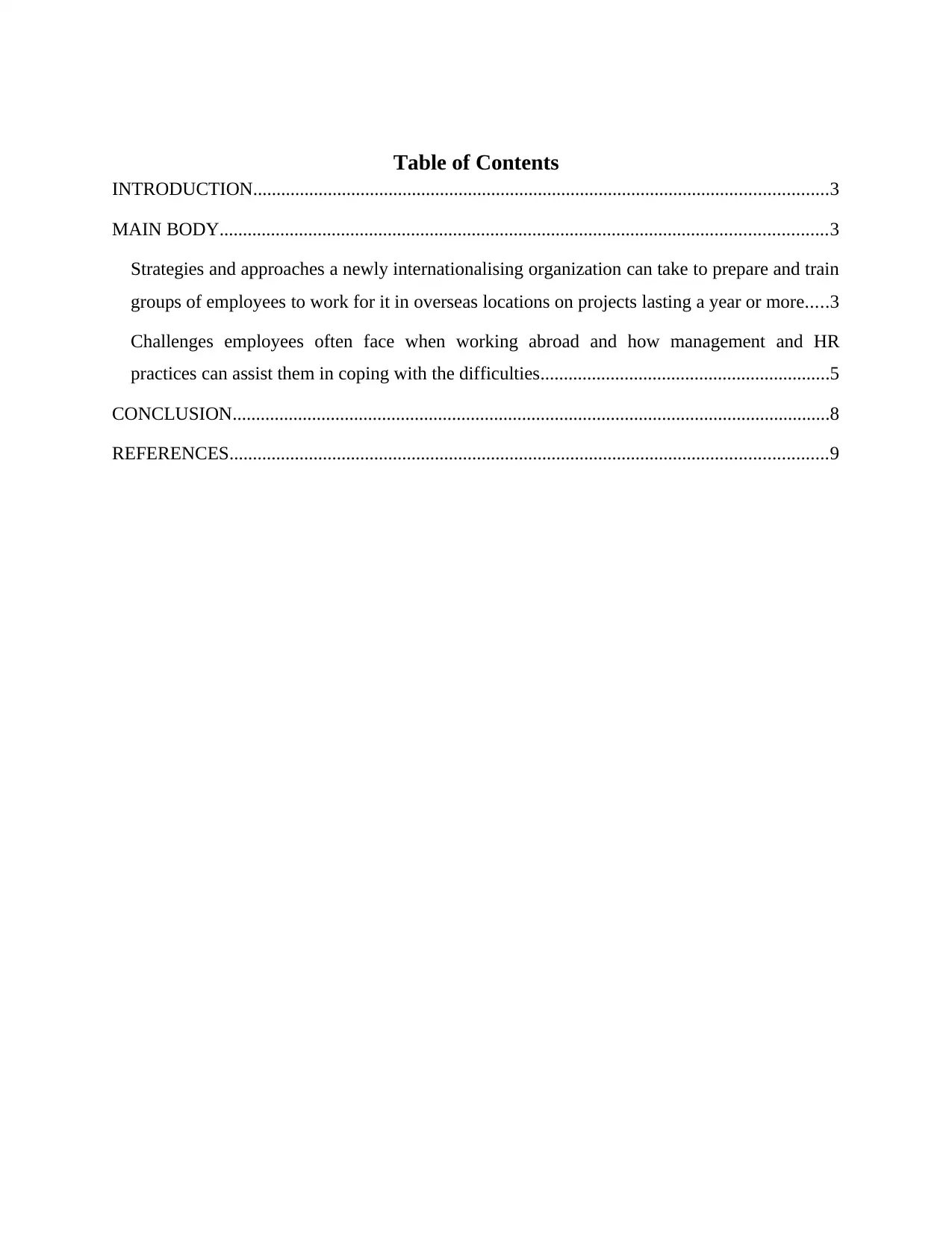
Table of Contents
INTRODUCTION...........................................................................................................................3
MAIN BODY..................................................................................................................................3
Strategies and approaches a newly internationalising organization can take to prepare and train
groups of employees to work for it in overseas locations on projects lasting a year or more.....3
Challenges employees often face when working abroad and how management and HR
practices can assist them in coping with the difficulties..............................................................5
CONCLUSION................................................................................................................................8
REFERENCES................................................................................................................................9
INTRODUCTION...........................................................................................................................3
MAIN BODY..................................................................................................................................3
Strategies and approaches a newly internationalising organization can take to prepare and train
groups of employees to work for it in overseas locations on projects lasting a year or more.....3
Challenges employees often face when working abroad and how management and HR
practices can assist them in coping with the difficulties..............................................................5
CONCLUSION................................................................................................................................8
REFERENCES................................................................................................................................9
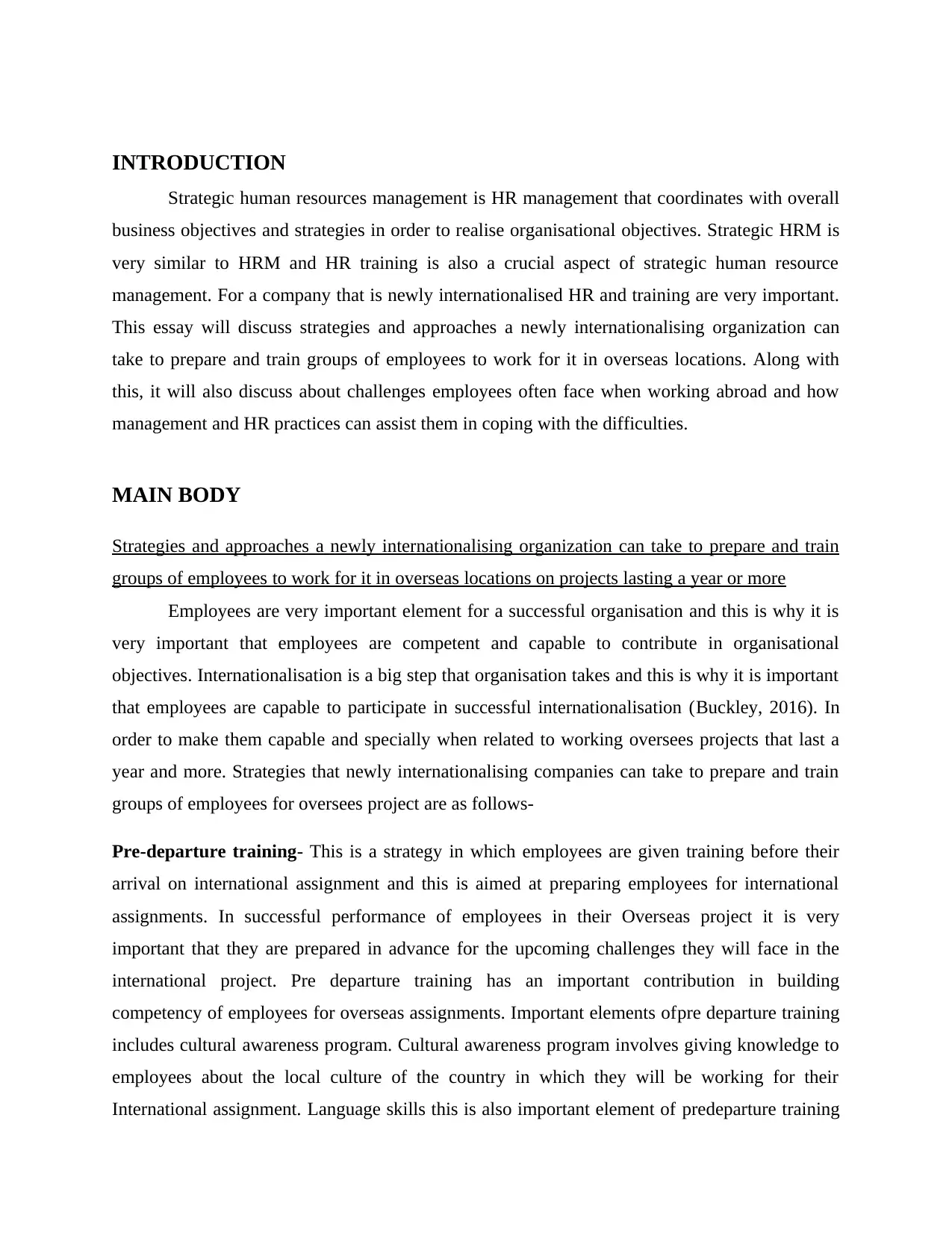
INTRODUCTION
Strategic human resources management is HR management that coordinates with overall
business objectives and strategies in order to realise organisational objectives. Strategic HRM is
very similar to HRM and HR training is also a crucial aspect of strategic human resource
management. For a company that is newly internationalised HR and training are very important.
This essay will discuss strategies and approaches a newly internationalising organization can
take to prepare and train groups of employees to work for it in overseas locations. Along with
this, it will also discuss about challenges employees often face when working abroad and how
management and HR practices can assist them in coping with the difficulties.
MAIN BODY
Strategies and approaches a newly internationalising organization can take to prepare and train
groups of employees to work for it in overseas locations on projects lasting a year or more
Employees are very important element for a successful organisation and this is why it is
very important that employees are competent and capable to contribute in organisational
objectives. Internationalisation is a big step that organisation takes and this is why it is important
that employees are capable to participate in successful internationalisation (Buckley, 2016). In
order to make them capable and specially when related to working oversees projects that last a
year and more. Strategies that newly internationalising companies can take to prepare and train
groups of employees for oversees project are as follows-
Pre-departure training- This is a strategy in which employees are given training before their
arrival on international assignment and this is aimed at preparing employees for international
assignments. In successful performance of employees in their Overseas project it is very
important that they are prepared in advance for the upcoming challenges they will face in the
international project. Pre departure training has an important contribution in building
competency of employees for overseas assignments. Important elements ofpre departure training
includes cultural awareness program. Cultural awareness program involves giving knowledge to
employees about the local culture of the country in which they will be working for their
International assignment. Language skills this is also important element of predeparture training
Strategic human resources management is HR management that coordinates with overall
business objectives and strategies in order to realise organisational objectives. Strategic HRM is
very similar to HRM and HR training is also a crucial aspect of strategic human resource
management. For a company that is newly internationalised HR and training are very important.
This essay will discuss strategies and approaches a newly internationalising organization can
take to prepare and train groups of employees to work for it in overseas locations. Along with
this, it will also discuss about challenges employees often face when working abroad and how
management and HR practices can assist them in coping with the difficulties.
MAIN BODY
Strategies and approaches a newly internationalising organization can take to prepare and train
groups of employees to work for it in overseas locations on projects lasting a year or more
Employees are very important element for a successful organisation and this is why it is
very important that employees are competent and capable to contribute in organisational
objectives. Internationalisation is a big step that organisation takes and this is why it is important
that employees are capable to participate in successful internationalisation (Buckley, 2016). In
order to make them capable and specially when related to working oversees projects that last a
year and more. Strategies that newly internationalising companies can take to prepare and train
groups of employees for oversees project are as follows-
Pre-departure training- This is a strategy in which employees are given training before their
arrival on international assignment and this is aimed at preparing employees for international
assignments. In successful performance of employees in their Overseas project it is very
important that they are prepared in advance for the upcoming challenges they will face in the
international project. Pre departure training has an important contribution in building
competency of employees for overseas assignments. Important elements ofpre departure training
includes cultural awareness program. Cultural awareness program involves giving knowledge to
employees about the local culture of the country in which they will be working for their
International assignment. Language skills this is also important element of predeparture training
⊘ This is a preview!⊘
Do you want full access?
Subscribe today to unlock all pages.

Trusted by 1+ million students worldwide
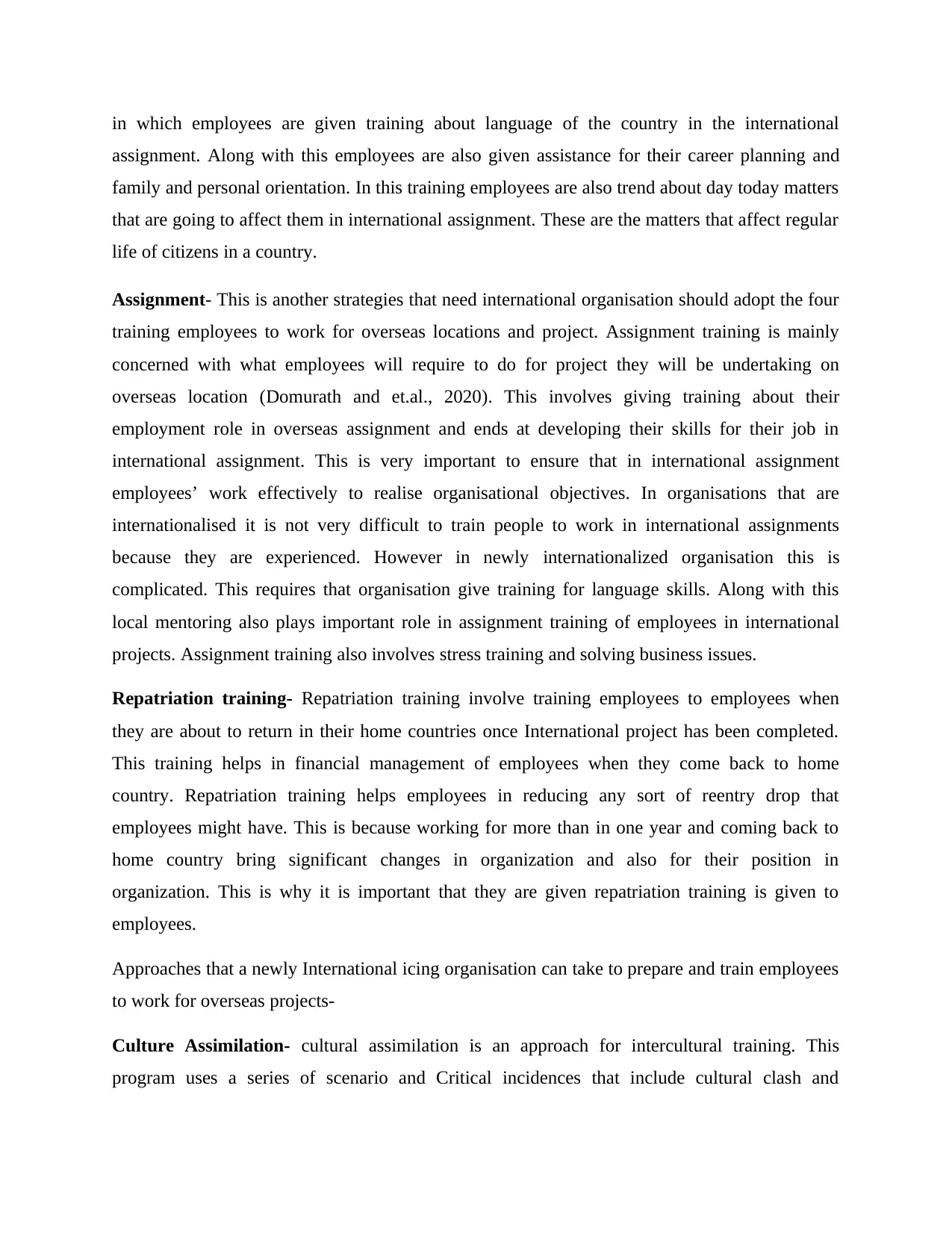
in which employees are given training about language of the country in the international
assignment. Along with this employees are also given assistance for their career planning and
family and personal orientation. In this training employees are also trend about day today matters
that are going to affect them in international assignment. These are the matters that affect regular
life of citizens in a country.
Assignment- This is another strategies that need international organisation should adopt the four
training employees to work for overseas locations and project. Assignment training is mainly
concerned with what employees will require to do for project they will be undertaking on
overseas location (Domurath and et.al., 2020). This involves giving training about their
employment role in overseas assignment and ends at developing their skills for their job in
international assignment. This is very important to ensure that in international assignment
employees’ work effectively to realise organisational objectives. In organisations that are
internationalised it is not very difficult to train people to work in international assignments
because they are experienced. However in newly internationalized organisation this is
complicated. This requires that organisation give training for language skills. Along with this
local mentoring also plays important role in assignment training of employees in international
projects. Assignment training also involves stress training and solving business issues.
Repatriation training- Repatriation training involve training employees to employees when
they are about to return in their home countries once International project has been completed.
This training helps in financial management of employees when they come back to home
country. Repatriation training helps employees in reducing any sort of reentry drop that
employees might have. This is because working for more than in one year and coming back to
home country bring significant changes in organization and also for their position in
organization. This is why it is important that they are given repatriation training is given to
employees.
Approaches that a newly International icing organisation can take to prepare and train employees
to work for overseas projects-
Culture Assimilation- cultural assimilation is an approach for intercultural training. This
program uses a series of scenario and Critical incidences that include cultural clash and
assignment. Along with this employees are also given assistance for their career planning and
family and personal orientation. In this training employees are also trend about day today matters
that are going to affect them in international assignment. These are the matters that affect regular
life of citizens in a country.
Assignment- This is another strategies that need international organisation should adopt the four
training employees to work for overseas locations and project. Assignment training is mainly
concerned with what employees will require to do for project they will be undertaking on
overseas location (Domurath and et.al., 2020). This involves giving training about their
employment role in overseas assignment and ends at developing their skills for their job in
international assignment. This is very important to ensure that in international assignment
employees’ work effectively to realise organisational objectives. In organisations that are
internationalised it is not very difficult to train people to work in international assignments
because they are experienced. However in newly internationalized organisation this is
complicated. This requires that organisation give training for language skills. Along with this
local mentoring also plays important role in assignment training of employees in international
projects. Assignment training also involves stress training and solving business issues.
Repatriation training- Repatriation training involve training employees to employees when
they are about to return in their home countries once International project has been completed.
This training helps in financial management of employees when they come back to home
country. Repatriation training helps employees in reducing any sort of reentry drop that
employees might have. This is because working for more than in one year and coming back to
home country bring significant changes in organization and also for their position in
organization. This is why it is important that they are given repatriation training is given to
employees.
Approaches that a newly International icing organisation can take to prepare and train employees
to work for overseas projects-
Culture Assimilation- cultural assimilation is an approach for intercultural training. This
program uses a series of scenario and Critical incidences that include cultural clash and
Paraphrase This Document
Need a fresh take? Get an instant paraphrase of this document with our AI Paraphraser
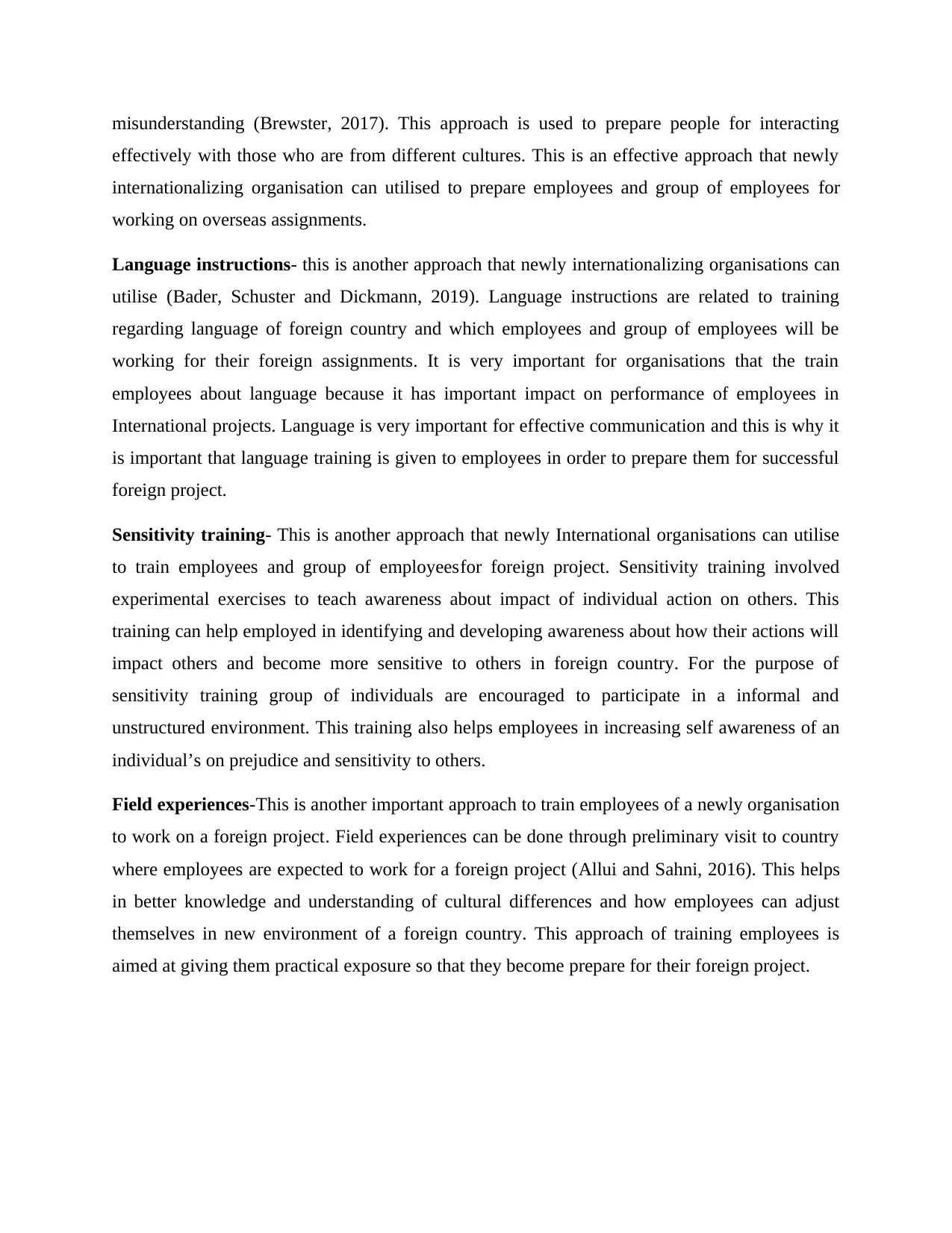
misunderstanding (Brewster, 2017). This approach is used to prepare people for interacting
effectively with those who are from different cultures. This is an effective approach that newly
internationalizing organisation can utilised to prepare employees and group of employees for
working on overseas assignments.
Language instructions- this is another approach that newly internationalizing organisations can
utilise (Bader, Schuster and Dickmann, 2019). Language instructions are related to training
regarding language of foreign country and which employees and group of employees will be
working for their foreign assignments. It is very important for organisations that the train
employees about language because it has important impact on performance of employees in
International projects. Language is very important for effective communication and this is why it
is important that language training is given to employees in order to prepare them for successful
foreign project.
Sensitivity training- This is another approach that newly International organisations can utilise
to train employees and group of employeesfor foreign project. Sensitivity training involved
experimental exercises to teach awareness about impact of individual action on others. This
training can help employed in identifying and developing awareness about how their actions will
impact others and become more sensitive to others in foreign country. For the purpose of
sensitivity training group of individuals are encouraged to participate in a informal and
unstructured environment. This training also helps employees in increasing self awareness of an
individual’s on prejudice and sensitivity to others.
Field experiences-This is another important approach to train employees of a newly organisation
to work on a foreign project. Field experiences can be done through preliminary visit to country
where employees are expected to work for a foreign project (Allui and Sahni, 2016). This helps
in better knowledge and understanding of cultural differences and how employees can adjust
themselves in new environment of a foreign country. This approach of training employees is
aimed at giving them practical exposure so that they become prepare for their foreign project.
effectively with those who are from different cultures. This is an effective approach that newly
internationalizing organisation can utilised to prepare employees and group of employees for
working on overseas assignments.
Language instructions- this is another approach that newly internationalizing organisations can
utilise (Bader, Schuster and Dickmann, 2019). Language instructions are related to training
regarding language of foreign country and which employees and group of employees will be
working for their foreign assignments. It is very important for organisations that the train
employees about language because it has important impact on performance of employees in
International projects. Language is very important for effective communication and this is why it
is important that language training is given to employees in order to prepare them for successful
foreign project.
Sensitivity training- This is another approach that newly International organisations can utilise
to train employees and group of employeesfor foreign project. Sensitivity training involved
experimental exercises to teach awareness about impact of individual action on others. This
training can help employed in identifying and developing awareness about how their actions will
impact others and become more sensitive to others in foreign country. For the purpose of
sensitivity training group of individuals are encouraged to participate in a informal and
unstructured environment. This training also helps employees in increasing self awareness of an
individual’s on prejudice and sensitivity to others.
Field experiences-This is another important approach to train employees of a newly organisation
to work on a foreign project. Field experiences can be done through preliminary visit to country
where employees are expected to work for a foreign project (Allui and Sahni, 2016). This helps
in better knowledge and understanding of cultural differences and how employees can adjust
themselves in new environment of a foreign country. This approach of training employees is
aimed at giving them practical exposure so that they become prepare for their foreign project.
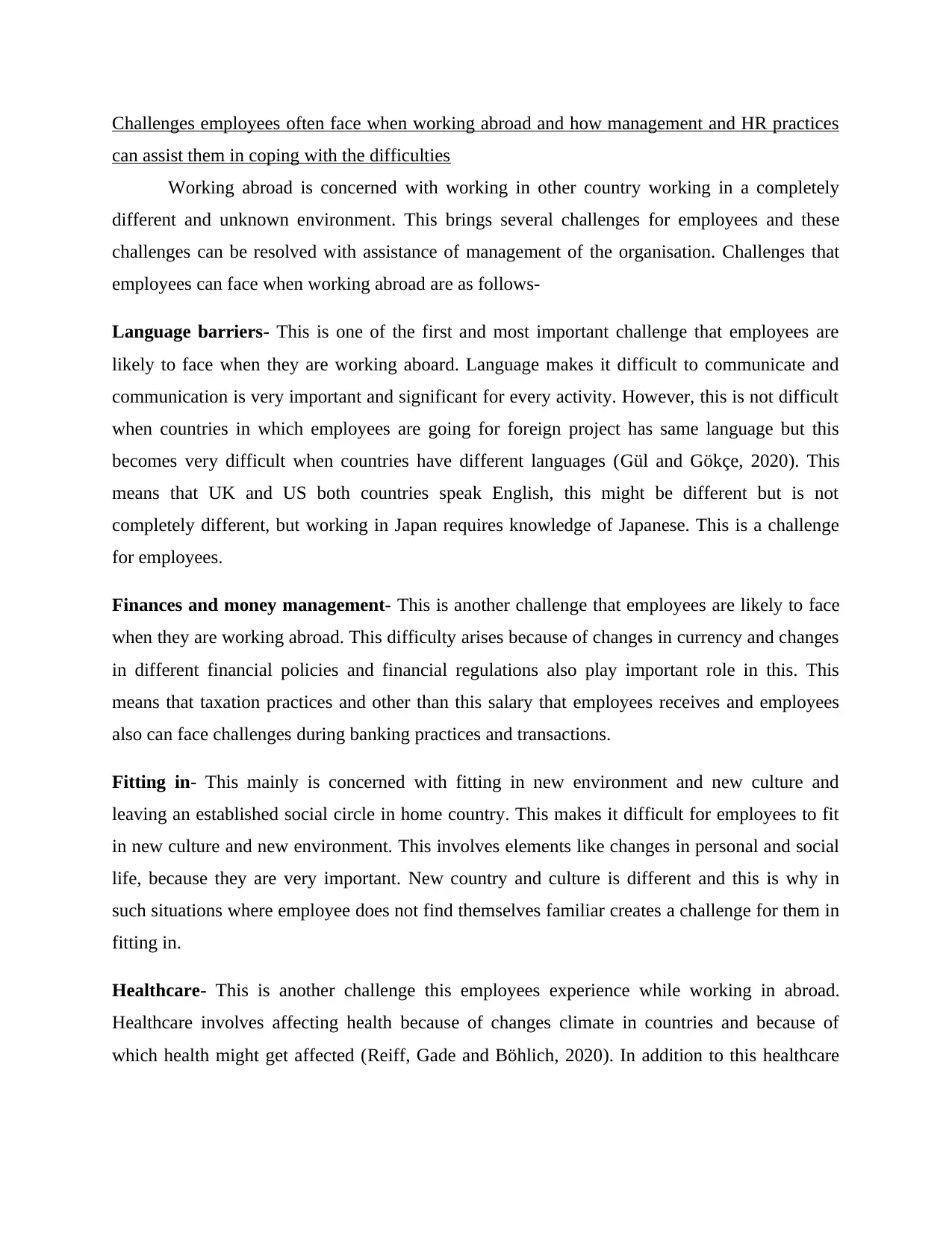
Challenges employees often face when working abroad and how management and HR practices
can assist them in coping with the difficulties
Working abroad is concerned with working in other country working in a completely
different and unknown environment. This brings several challenges for employees and these
challenges can be resolved with assistance of management of the organisation. Challenges that
employees can face when working abroad are as follows-
Language barriers- This is one of the first and most important challenge that employees are
likely to face when they are working aboard. Language makes it difficult to communicate and
communication is very important and significant for every activity. However, this is not difficult
when countries in which employees are going for foreign project has same language but this
becomes very difficult when countries have different languages (Gül and Gökçe, 2020). This
means that UK and US both countries speak English, this might be different but is not
completely different, but working in Japan requires knowledge of Japanese. This is a challenge
for employees.
Finances and money management- This is another challenge that employees are likely to face
when they are working abroad. This difficulty arises because of changes in currency and changes
in different financial policies and financial regulations also play important role in this. This
means that taxation practices and other than this salary that employees receives and employees
also can face challenges during banking practices and transactions.
Fitting in- This mainly is concerned with fitting in new environment and new culture and
leaving an established social circle in home country. This makes it difficult for employees to fit
in new culture and new environment. This involves elements like changes in personal and social
life, because they are very important. New country and culture is different and this is why in
such situations where employee does not find themselves familiar creates a challenge for them in
fitting in.
Healthcare- This is another challenge this employees experience while working in abroad.
Healthcare involves affecting health because of changes climate in countries and because of
which health might get affected (Reiff, Gade and Böhlich, 2020). In addition to this healthcare
can assist them in coping with the difficulties
Working abroad is concerned with working in other country working in a completely
different and unknown environment. This brings several challenges for employees and these
challenges can be resolved with assistance of management of the organisation. Challenges that
employees can face when working abroad are as follows-
Language barriers- This is one of the first and most important challenge that employees are
likely to face when they are working aboard. Language makes it difficult to communicate and
communication is very important and significant for every activity. However, this is not difficult
when countries in which employees are going for foreign project has same language but this
becomes very difficult when countries have different languages (Gül and Gökçe, 2020). This
means that UK and US both countries speak English, this might be different but is not
completely different, but working in Japan requires knowledge of Japanese. This is a challenge
for employees.
Finances and money management- This is another challenge that employees are likely to face
when they are working abroad. This difficulty arises because of changes in currency and changes
in different financial policies and financial regulations also play important role in this. This
means that taxation practices and other than this salary that employees receives and employees
also can face challenges during banking practices and transactions.
Fitting in- This mainly is concerned with fitting in new environment and new culture and
leaving an established social circle in home country. This makes it difficult for employees to fit
in new culture and new environment. This involves elements like changes in personal and social
life, because they are very important. New country and culture is different and this is why in
such situations where employee does not find themselves familiar creates a challenge for them in
fitting in.
Healthcare- This is another challenge this employees experience while working in abroad.
Healthcare involves affecting health because of changes climate in countries and because of
which health might get affected (Reiff, Gade and Böhlich, 2020). In addition to this healthcare
⊘ This is a preview!⊘
Do you want full access?
Subscribe today to unlock all pages.

Trusted by 1+ million students worldwide
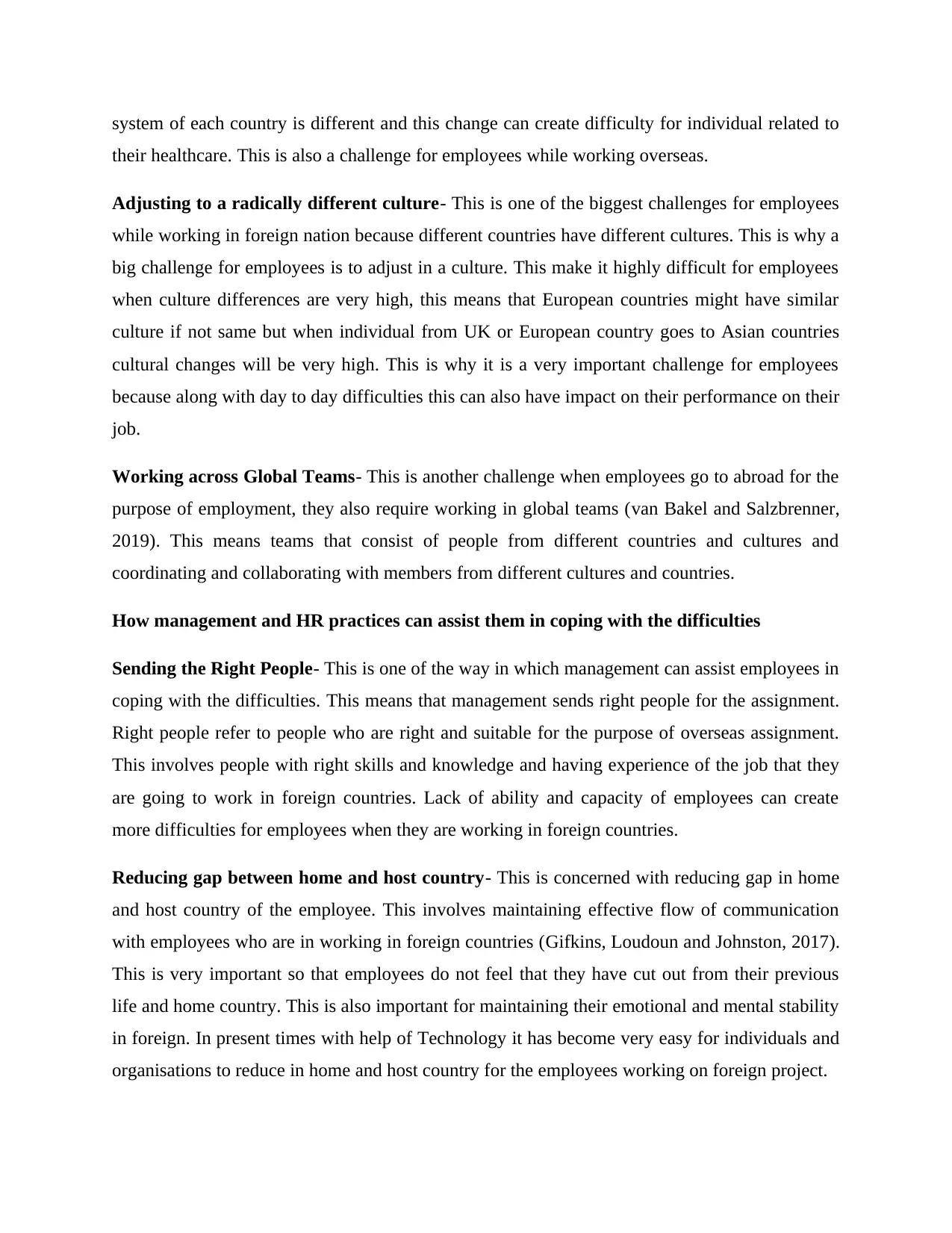
system of each country is different and this change can create difficulty for individual related to
their healthcare. This is also a challenge for employees while working overseas.
Adjusting to a radically different culture- This is one of the biggest challenges for employees
while working in foreign nation because different countries have different cultures. This is why a
big challenge for employees is to adjust in a culture. This make it highly difficult for employees
when culture differences are very high, this means that European countries might have similar
culture if not same but when individual from UK or European country goes to Asian countries
cultural changes will be very high. This is why it is a very important challenge for employees
because along with day to day difficulties this can also have impact on their performance on their
job.
Working across Global Teams- This is another challenge when employees go to abroad for the
purpose of employment, they also require working in global teams (van Bakel and Salzbrenner,
2019). This means teams that consist of people from different countries and cultures and
coordinating and collaborating with members from different cultures and countries.
How management and HR practices can assist them in coping with the difficulties
Sending the Right People- This is one of the way in which management can assist employees in
coping with the difficulties. This means that management sends right people for the assignment.
Right people refer to people who are right and suitable for the purpose of overseas assignment.
This involves people with right skills and knowledge and having experience of the job that they
are going to work in foreign countries. Lack of ability and capacity of employees can create
more difficulties for employees when they are working in foreign countries.
Reducing gap between home and host country- This is concerned with reducing gap in home
and host country of the employee. This involves maintaining effective flow of communication
with employees who are in working in foreign countries (Gifkins, Loudoun and Johnston, 2017).
This is very important so that employees do not feel that they have cut out from their previous
life and home country. This is also important for maintaining their emotional and mental stability
in foreign. In present times with help of Technology it has become very easy for individuals and
organisations to reduce in home and host country for the employees working on foreign project.
their healthcare. This is also a challenge for employees while working overseas.
Adjusting to a radically different culture- This is one of the biggest challenges for employees
while working in foreign nation because different countries have different cultures. This is why a
big challenge for employees is to adjust in a culture. This make it highly difficult for employees
when culture differences are very high, this means that European countries might have similar
culture if not same but when individual from UK or European country goes to Asian countries
cultural changes will be very high. This is why it is a very important challenge for employees
because along with day to day difficulties this can also have impact on their performance on their
job.
Working across Global Teams- This is another challenge when employees go to abroad for the
purpose of employment, they also require working in global teams (van Bakel and Salzbrenner,
2019). This means teams that consist of people from different countries and cultures and
coordinating and collaborating with members from different cultures and countries.
How management and HR practices can assist them in coping with the difficulties
Sending the Right People- This is one of the way in which management can assist employees in
coping with the difficulties. This means that management sends right people for the assignment.
Right people refer to people who are right and suitable for the purpose of overseas assignment.
This involves people with right skills and knowledge and having experience of the job that they
are going to work in foreign countries. Lack of ability and capacity of employees can create
more difficulties for employees when they are working in foreign countries.
Reducing gap between home and host country- This is concerned with reducing gap in home
and host country of the employee. This involves maintaining effective flow of communication
with employees who are in working in foreign countries (Gifkins, Loudoun and Johnston, 2017).
This is very important so that employees do not feel that they have cut out from their previous
life and home country. This is also important for maintaining their emotional and mental stability
in foreign. In present times with help of Technology it has become very easy for individuals and
organisations to reduce in home and host country for the employees working on foreign project.
Paraphrase This Document
Need a fresh take? Get an instant paraphrase of this document with our AI Paraphraser
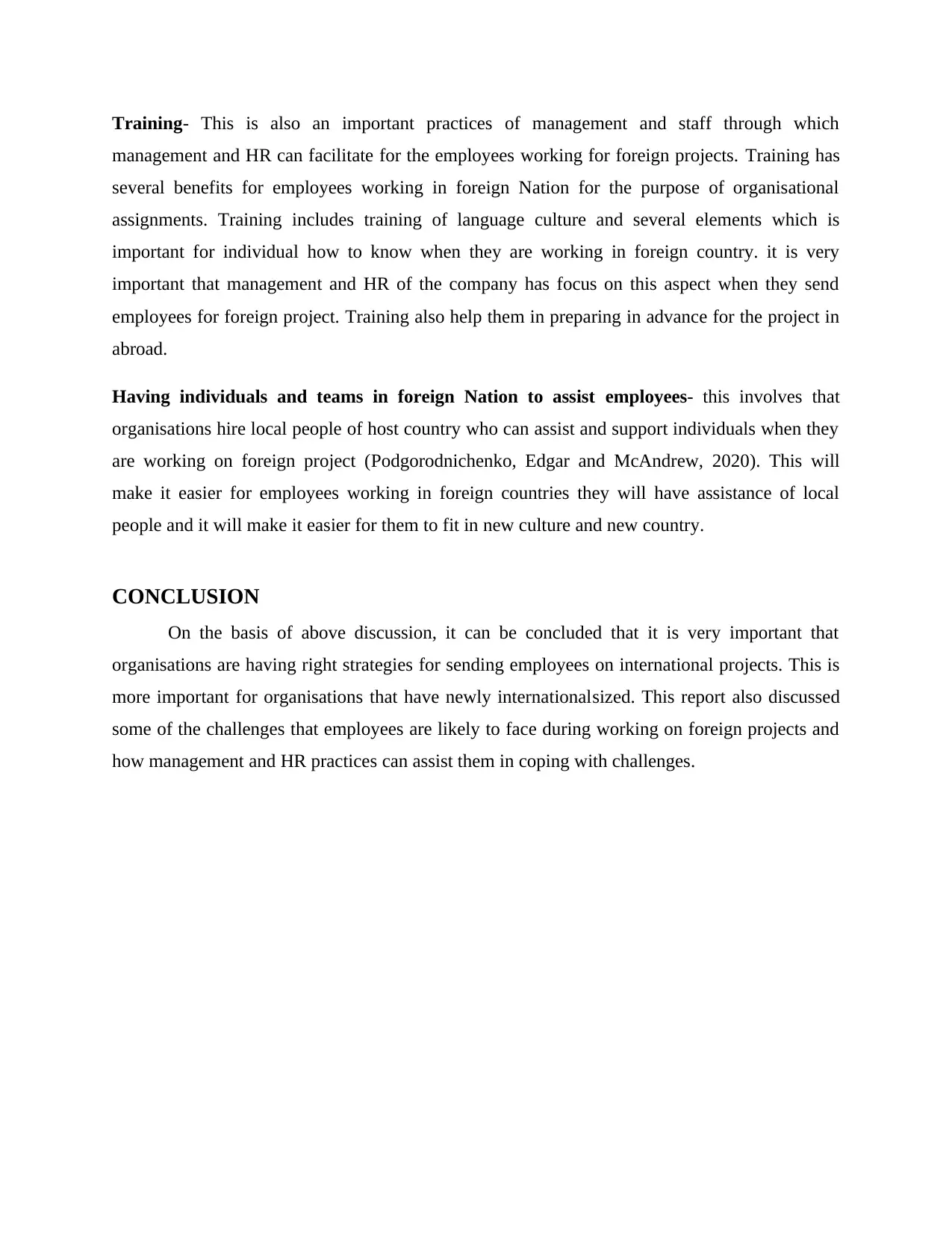
Training- This is also an important practices of management and staff through which
management and HR can facilitate for the employees working for foreign projects. Training has
several benefits for employees working in foreign Nation for the purpose of organisational
assignments. Training includes training of language culture and several elements which is
important for individual how to know when they are working in foreign country. it is very
important that management and HR of the company has focus on this aspect when they send
employees for foreign project. Training also help them in preparing in advance for the project in
abroad.
Having individuals and teams in foreign Nation to assist employees- this involves that
organisations hire local people of host country who can assist and support individuals when they
are working on foreign project (Podgorodnichenko, Edgar and McAndrew, 2020). This will
make it easier for employees working in foreign countries they will have assistance of local
people and it will make it easier for them to fit in new culture and new country.
CONCLUSION
On the basis of above discussion, it can be concluded that it is very important that
organisations are having right strategies for sending employees on international projects. This is
more important for organisations that have newly internationalsized. This report also discussed
some of the challenges that employees are likely to face during working on foreign projects and
how management and HR practices can assist them in coping with challenges.
management and HR can facilitate for the employees working for foreign projects. Training has
several benefits for employees working in foreign Nation for the purpose of organisational
assignments. Training includes training of language culture and several elements which is
important for individual how to know when they are working in foreign country. it is very
important that management and HR of the company has focus on this aspect when they send
employees for foreign project. Training also help them in preparing in advance for the project in
abroad.
Having individuals and teams in foreign Nation to assist employees- this involves that
organisations hire local people of host country who can assist and support individuals when they
are working on foreign project (Podgorodnichenko, Edgar and McAndrew, 2020). This will
make it easier for employees working in foreign countries they will have assistance of local
people and it will make it easier for them to fit in new culture and new country.
CONCLUSION
On the basis of above discussion, it can be concluded that it is very important that
organisations are having right strategies for sending employees on international projects. This is
more important for organisations that have newly internationalsized. This report also discussed
some of the challenges that employees are likely to face during working on foreign projects and
how management and HR practices can assist them in coping with challenges.
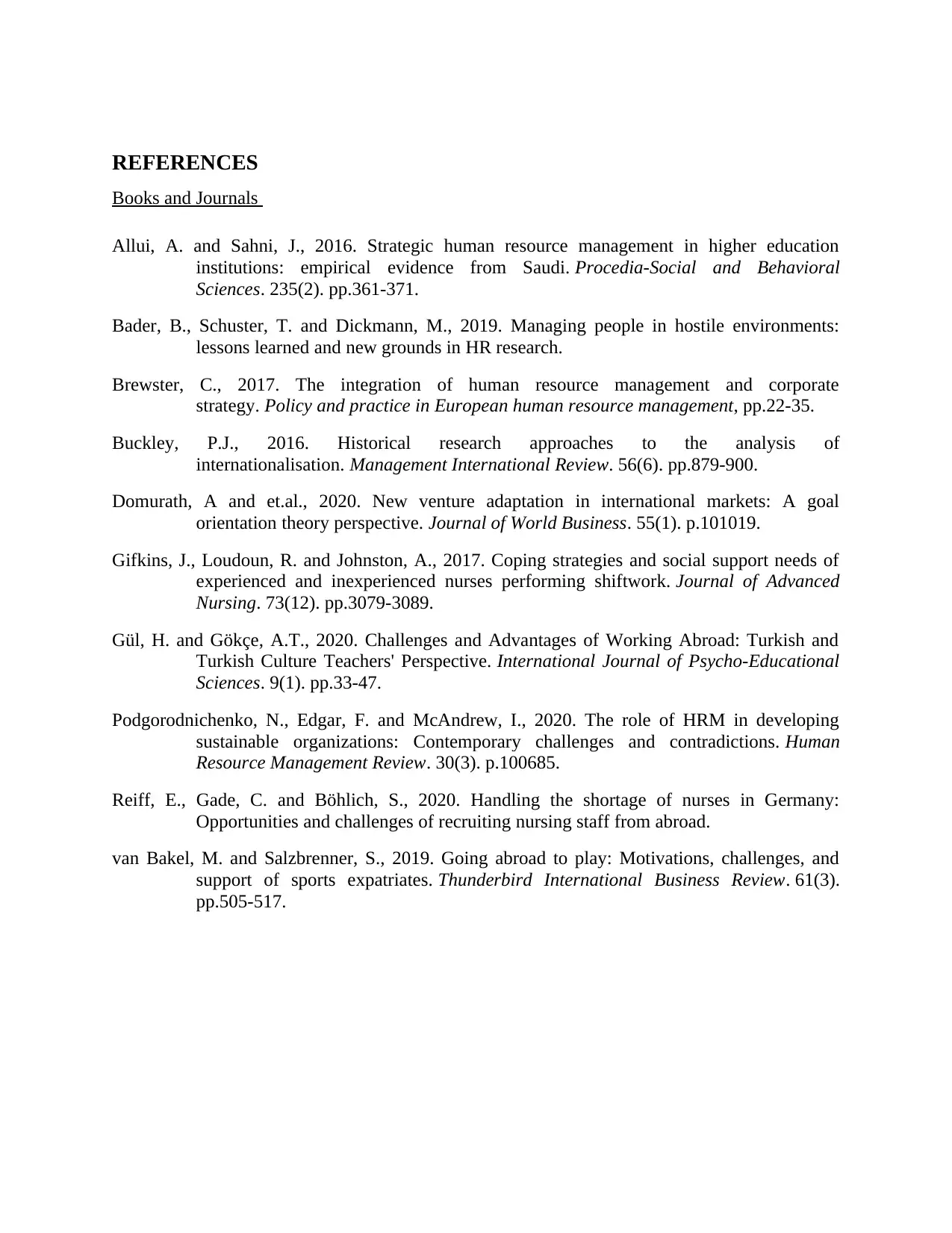
REFERENCES
Books and Journals
Allui, A. and Sahni, J., 2016. Strategic human resource management in higher education
institutions: empirical evidence from Saudi. Procedia-Social and Behavioral
Sciences. 235(2). pp.361-371.
Bader, B., Schuster, T. and Dickmann, M., 2019. Managing people in hostile environments:
lessons learned and new grounds in HR research.
Brewster, C., 2017. The integration of human resource management and corporate
strategy. Policy and practice in European human resource management, pp.22-35.
Buckley, P.J., 2016. Historical research approaches to the analysis of
internationalisation. Management International Review. 56(6). pp.879-900.
Domurath, A and et.al., 2020. New venture adaptation in international markets: A goal
orientation theory perspective. Journal of World Business. 55(1). p.101019.
Gifkins, J., Loudoun, R. and Johnston, A., 2017. Coping strategies and social support needs of
experienced and inexperienced nurses performing shiftwork. Journal of Advanced
Nursing. 73(12). pp.3079-3089.
Gül, H. and Gökçe, A.T., 2020. Challenges and Advantages of Working Abroad: Turkish and
Turkish Culture Teachers' Perspective. International Journal of Psycho-Educational
Sciences. 9(1). pp.33-47.
Podgorodnichenko, N., Edgar, F. and McAndrew, I., 2020. The role of HRM in developing
sustainable organizations: Contemporary challenges and contradictions. Human
Resource Management Review. 30(3). p.100685.
Reiff, E., Gade, C. and Böhlich, S., 2020. Handling the shortage of nurses in Germany:
Opportunities and challenges of recruiting nursing staff from abroad.
van Bakel, M. and Salzbrenner, S., 2019. Going abroad to play: Motivations, challenges, and
support of sports expatriates. Thunderbird International Business Review. 61(3).
pp.505-517.
Books and Journals
Allui, A. and Sahni, J., 2016. Strategic human resource management in higher education
institutions: empirical evidence from Saudi. Procedia-Social and Behavioral
Sciences. 235(2). pp.361-371.
Bader, B., Schuster, T. and Dickmann, M., 2019. Managing people in hostile environments:
lessons learned and new grounds in HR research.
Brewster, C., 2017. The integration of human resource management and corporate
strategy. Policy and practice in European human resource management, pp.22-35.
Buckley, P.J., 2016. Historical research approaches to the analysis of
internationalisation. Management International Review. 56(6). pp.879-900.
Domurath, A and et.al., 2020. New venture adaptation in international markets: A goal
orientation theory perspective. Journal of World Business. 55(1). p.101019.
Gifkins, J., Loudoun, R. and Johnston, A., 2017. Coping strategies and social support needs of
experienced and inexperienced nurses performing shiftwork. Journal of Advanced
Nursing. 73(12). pp.3079-3089.
Gül, H. and Gökçe, A.T., 2020. Challenges and Advantages of Working Abroad: Turkish and
Turkish Culture Teachers' Perspective. International Journal of Psycho-Educational
Sciences. 9(1). pp.33-47.
Podgorodnichenko, N., Edgar, F. and McAndrew, I., 2020. The role of HRM in developing
sustainable organizations: Contemporary challenges and contradictions. Human
Resource Management Review. 30(3). p.100685.
Reiff, E., Gade, C. and Böhlich, S., 2020. Handling the shortage of nurses in Germany:
Opportunities and challenges of recruiting nursing staff from abroad.
van Bakel, M. and Salzbrenner, S., 2019. Going abroad to play: Motivations, challenges, and
support of sports expatriates. Thunderbird International Business Review. 61(3).
pp.505-517.
⊘ This is a preview!⊘
Do you want full access?
Subscribe today to unlock all pages.

Trusted by 1+ million students worldwide
1 out of 9
Related Documents
Your All-in-One AI-Powered Toolkit for Academic Success.
+13062052269
info@desklib.com
Available 24*7 on WhatsApp / Email
![[object Object]](/_next/static/media/star-bottom.7253800d.svg)
Unlock your academic potential
Copyright © 2020–2025 A2Z Services. All Rights Reserved. Developed and managed by ZUCOL.





